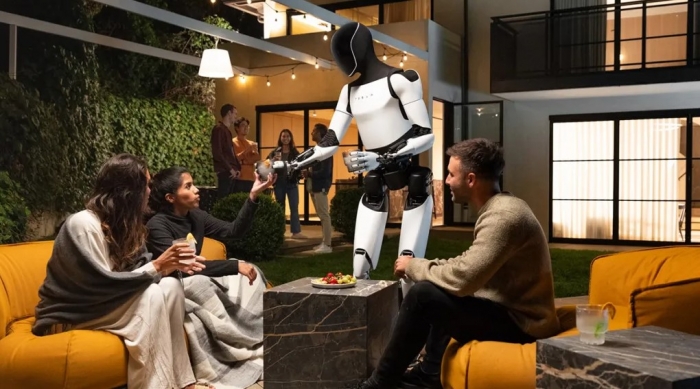Musk Unveils Robot Barman
A Future of Robot Bartenders and Sommeliers
2024-10-17

Elon Musk has once again captured global attention with the unveiling of Tesla's latest version of its humanoid robot, Optimus, during the Cybercab event. These advanced robots are designed with capabilities that could revolutionize several industries, including hospitality. At the event, Optimus not only walked among the audience, engaging in conversations with attendees, but also demonstrated an impressive new skill: serving drinks. This functionality, alongside its sophisticated dexterity, opens the door to transforming bars, restaurants, and even private homes.
During the presentation, Musk showcased several videos where Optimus was seen interacting with objects, carefully handling drinkware, and serving beverages. One of the most memorable moments of the event came when one of these robots smoothly served a beer to a guest, highlighting its potential to replace human staff in certain service roles. Musk elaborated on how these robots, powered by Tesla's artificial intelligence and the company's Grok platform, could eventually become experts in beverage service. He noted that these robots could soon have access to vast databases, allowing them to recommend wines, beers, and cocktails tailored to the preferences of each customer. This personalized service, according to Musk, would enhance the customer experience in bars and restaurants, offering faster, more efficient service without the need for human waitstaff or bartenders.
The Tesla Optimus bot serving drinks at the Tesla 'We, Robot' Event.
— Wevolver (@WevolverApp) October 11, 2024
Video Credit: Tesla#tesla #teslabot #robots #engineering #technology pic.twitter.com/H6rPHN8P5t
In typical Musk fashion, he made bold predictions about the future of Tesla's humanoid robots. He suggested that the robots would not be limited to hospitality roles. Instead, they could perform a wide range of tasks, from package delivery to childcare, and even household chores such as gardening or walking the dog. This vision of a robot capable of handling virtually any task opens the possibility of widespread adoption across various sectors. Musk estimated that these robots would be affordable for the general public, with prices ranging between $20,000 and $30,000, which would place them below the cost of many cars on the market today.
Musk took time to reflect on the rapid progress of Tesla's robotics development. He reminded the audience that just a few years ago, the company's presentation of Optimus was met with some skepticism. At that time, Tesla had showcased a person dressed in a robot suit to demonstrate the concept of a humanoid robot. Since then, Tesla has moved quickly from that initial concept to developing a fully functional prototype. The robots presented at Cybercab were capable of walking autonomously, handling complex objects, and performing intricate tasks without human intervention. Musk emphasized that this leap in development underscores how rapidly the technology is advancing. Still, he tempered expectations by noting that although the robots might be ready for commercial release by the end of next year, full integration into daily life will take time, and widespread adoption across industries is a long-term vision.
The potential impact of these robots on the hospitality industry, particularly in the wine and beverage sector, is immense. Optimus robots could fundamentally change the way drinks are served in restaurants, bars, and hotels. Not only would they be able to serve drinks efficiently, but they would also have the capability to recommend drinks based on customer preferences, using advanced artificial intelligence and machine learning algorithms. This level of customization could elevate the experience for customers, offering them tailored recommendations similar to what a human sommelier or bartender might provide. Musk explained that these robots are designed not just for private home use but also for large-scale application in the service industry, where businesses could see significant cost savings by replacing human labor with autonomous robots capable of performing multiple tasks.
The potential for cost savings in the hospitality industry is one of the key selling points of the Optimus robots. Musk spoke of a "new era of abundance" where businesses could reduce operational costs by employing robots that don't require salaries, benefits, or time off. This shift toward automation, Musk suggested, could make services more accessible and affordable to the general public, creating a more efficient and cost-effective service model. For example, bars and restaurants could reduce overhead by utilizing robots to serve drinks and handle routine tasks, freeing up human staff to focus on higher-level customer service or eliminating the need for human staff altogether.
As exciting as the prospect of humanoid robots in hospitality is, it also raises questions about the future of jobs like sommeliers, bartenders, and servers. While it's too early to determine whether robots will fully replace these professionals, the demonstration of Optimus serving drinks at Cybercab highlights the potential for automation to play a significant role in customer service. With Musk's prediction that Optimus robots will become a common presence in both private and commercial spaces, the future of the service industry could be fundamentally reshaped by the adoption of these advanced machines. However, the full effects of this technological shift will likely not be realized for years, as the robots transition from novelty to everyday utility.
Founded in 2007, Vinetur® is a registered trademark of VGSC S.L. with a long history in the wine industry.
VGSC, S.L. with VAT number B70255591 is a spanish company legally registered in the Commercial Register of the city of Santiago de Compostela, with registration number: Bulletin 181, Reference 356049 in Volume 13, Page 107, Section 6, Sheet 45028, Entry 2.
Email: [email protected]
Headquarters and offices located in Vilagarcia de Arousa, Spain.